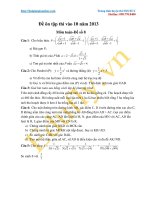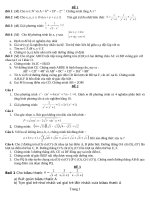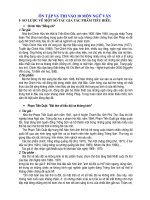On tap thi vao 10
Bạn đang xem bản rút gọn của tài liệu. Xem và tải ngay bản đầy đủ của tài liệu tại đây (42.41 KB, 2 trang )
<span class='text_page_counter'>(1)</span>Test 1 1. lungs: phổi. sinuses: xoang. allergy: di ứng. 2. infection: bênh lây nhiễm. itchy: ngứa. green phlegm: đờm dãi. 3. bronchitis: bệnh viêm cuống phổi. increase fluids: lỏng, dễ chảy. advocate: ủng hộ. 4. respiratory: sự thở, hô hấp. green mucous: nhầy xanh. persist: dai dẳng. 5. fluid: lỏng, dễ chảy. dehydration: mất nước. tilt: đặt nghiêng. 6. choke: tắc, nghẹt thở. vomit: nôn. intravenous: tĩnh mạch. 7. appetitive: thèm ăn. liver: gan. hepatitis: benh viem gan. 8. chickenpox: bệnh thủy đậu. initial: ban đầu. 9. inhaling: hít vào. whooping cough: ho ra tiếng. pertussis: ho gà. 10. rheumatic: bệnh thấp khớp. inflammatory: dễ viêm, do viêm. strep: khuẩn liên cầu. 11. dehydration: tình trang mất nước. measles: bệnh sởi. diarrhea: bệnh ỉa chảy. antiviral: thuốc chống vi rút. II. Translate Sốc là 1 1 tình trạng đe dọa cuộc sống nó xả ra khi áp lực máu trong cơ thể hạ xuống dưới mức cho phép. Sốc có thể là kết quả của 1 cơn đau dữ dội, 1 vụ bỏng lớn, mất nhiều máu, ốm nặng, mất nước hoặc phản ứng của dị ứng mạnh. Nếu 1 người bất tỉnh: * Đặt người ấy nằm hạ đầu thấp, đặt nằm nghiêng 1 phía. Nếu người ấy bị nghẹt thở, dùng tay kéo lưỡi của anh ta. * Nếu người ấy bị nôn, lau sạch mồm ngay lập tức. Luôn để đầu người ấy thấp, nằm nghiêng để tránh hít chất nôn mửa vào phổi * Không cho ăn hoặc uống bất cứ thứ gì cho tới khi người ấy tỉnh lại. * Nếu bạn hoặc ai đó biết cách tiếp nước, để nhỏ giọt nhanh. * Tìm thuốc trợ giúp nhanh. IV. Make all 1. A peron who sufers from the shock often chokes. 2. Headaches are severed that she doesn’t get up and has no appetite. 3. Liver has especially high iron. 4. Hepatitis is more dangerous with adults than children. 5. These children look healthy because they eat food which contains a lot of vitamins. V. Vietnamese 1. The over 40-year old people should check eyesight once a year. Test 3 IV. Make all… 1. Dehydration is more dangerous with children than adults. 2. Any children watery diarrhea are danger of dehydration. 3. We are sick if we don’t eat foods with all necessary vitamins. 4. It’s important to find out the needs of sick people. 5. The flu spreads one person to another.
<span class='text_page_counter'>(2)</span> Test 4 IV. Make all… 1. Mr Baker went to work at 7.00 yesterday morning. 2. His temperature is higher today than yesterday. 3. It’s wise to take sick person’s temperature 4 times a day. 4. A baby who cries a lot, pulls his ear often has ear infection. 5. Small children often Test 5 IV. Make all… 1. Any children watery diarrhea are danger of dehydration. 2. When a baby cries a lot, pulls his ear often has ear infection. 3. We are sick if we don’t eat foods with all necessary vitamins. 4. Your son must be treated in the hospital because he is serious ill. 5. It is wise to take an oral medication travel sickness before the trip. Test 6 IV. Make all… 1. Dehydration is the most dangerous for small children. 2. The poor people can’t afford to buy foods which contain much protein. 3. Does anyone in your family or in the neighbourhood have the same illness? 4. Measles is a virus disease which killed many children in developing countries. 5. It’s unhealthy to live in a dirty and dark room. V. Vietnamese 1. Tuberculosis usually causes slight fever in the afternoon. lao 2. Malnutrition is. suy dinh dưỡng.
<span class='text_page_counter'>(3)</span>









